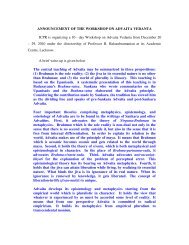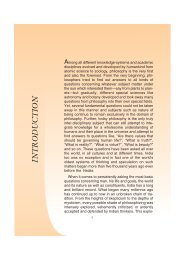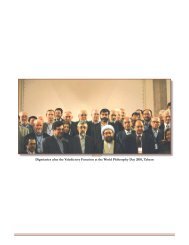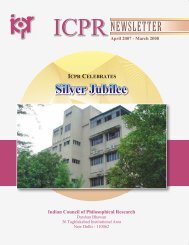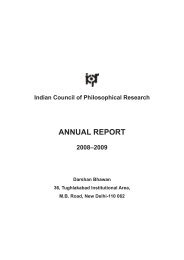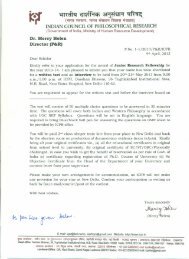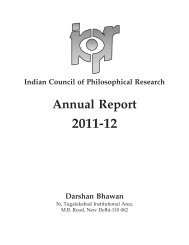(2010- 2011) English - Indian Council of Philosophical Research
(2010- 2011) English - Indian Council of Philosophical Research
(2010- 2011) English - Indian Council of Philosophical Research
Create successful ePaper yourself
Turn your PDF publications into a flip-book with our unique Google optimized e-Paper software.
through its extensive programme <strong>of</strong> fellowships and grants for seminars, conferences and research<br />
projects. It does not follow, however, that philosophy in the country is flourishing to the satisfaction<br />
<strong>of</strong> all <strong>of</strong> us.<br />
State <strong>of</strong> Philosophy in India<br />
The state <strong>of</strong> philosophy in the country unhappily is far from being satisfactory. Notwithstanding<br />
the support <strong>of</strong> ICPR and other organizations like the UGC and the <strong>Indian</strong> Institute <strong>of</strong> Advanced<br />
Study, philosophical research has not made any significant mark. This is all the more surprising<br />
because philosophy has enjoyed a place <strong>of</strong> pride and preeminence in <strong>Indian</strong> thought. There are<br />
important historical reasons for it. Philosophy, like other social science disciplines, suffered from<br />
centuries <strong>of</strong> colonial domination. Caught between the strong native tradition and the powerful<br />
western influence, philosophy suffered a kind <strong>of</strong> paralysis, lost its identity and became unable to<br />
significantly influence the course <strong>of</strong> national thinking.<br />
From the <strong>Indian</strong> perspective, philosophy cannot originate in a cultural vacuum. Philosophy has a<br />
practical and applied dimension that arm-chair philosophers tend to ignore. Applied philosophies are<br />
necessarily contextual, and not isolated but interdisciplinary. Again, this is the hallmark <strong>of</strong> wisdom<br />
as distinguished from knowledge. Also, philosophy may be seen as the running thread that weaves<br />
the cultural fabric. In a significant sense it is what gives identity and distinctiveness to a tradition.<br />
During the years <strong>of</strong> colonial dominance in many countries <strong>of</strong> Asia, knowledge was cut loose from<br />
the native traditions and this has resulted in an identity crisis in all culture-bound disciplines; and<br />
philosophy is the worst affected.<br />
Philosophy in India since the colonial period has suffered an identity crisis and is still reeling from<br />
its effects. This is all the more painful because <strong>Indian</strong> philosophy from classical times had its own<br />
identity. Philosophy in India tended to be applied in a large measure since Vedic times and up until<br />
the colonial period. It was nurtured by interdisciplinary involvement.<br />
Because <strong>of</strong> its avowed involvement with life, <strong>Indian</strong> philosophy grew along with religion, science<br />
and other human endeavours. So we find that Hindu scriptures like the Vedas and the Bhagavad<br />
Gita are rich sources <strong>of</strong> classical <strong>Indian</strong> philosophy. Here theory and practice went together. In<br />
fact, practice appears to have taken precedence over theory. Vedas are filled with rituals and only<br />
in the later Upanishads the theory is explicated. Ramayana is the epic about the ideal person; and<br />
the Yoga- Vasista tells us how such an ideal person is made, the practices needed to lead a man to<br />
perfection. Again, valuable philosophical ideas are embedded in medical texts like Caraka Samhitā,<br />
political-economic treatises like Kautilya’s Artha Shastra, legal codes like Jaimini’s Dharma Shastra,<br />
the art books like Bharata’s Natya-Shastra and Vatsyayana’s Kama-Sutra, and psychological thought<br />
and practices as in Patanjali’s Yoga-Sutra. Philosophy in India has been truly a wisdom discipline.<br />
Wisdom is knowledge applied to life. Life is ever changing; so are philosophies. However, there is<br />
a need for continuity and intellectual connectedness.<br />
This tradition <strong>of</strong> philosophy as wisdom to be cultivated continued unabated until British education<br />
6



